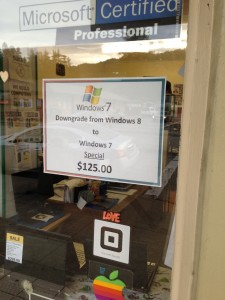“Your home is on fire. Grab five items (assume all people and animals are safe). What did you grab?”
I would rescue these items from my house:
- Important Documents Folder
- Backpack of Data
- Messenger Bag
- Antiques
- Family Photos
These are things that I cannot easily replace. Everything else would be a matter of homeowners insurance. While much of the things I would rescue, such as the Important Documents Folder may not be exactly irreplaceable it does hold some things that I have an emotional connection to, the real physical things that I have earned – like my High School Diploma and my Bachelors Diploma. I am sure I could get reproductions of both, but these are originals and they are important to me. Antiques may surprise people, that I have some which I do, and that they are on my list. Some things, even if they aren’t worth very much have an irrational value because they are physical threads leading backwards through time to people I never knew but revere because without them I would not exist. I list them as “antiques” because I do not want to cover what they are. They are important to me, and that’s good enough for me. I’ve taken the concepts of readiness that I did for my professional life at work and extended them to my home. There are some habits that I have like placing certain things in bags, like a backpack where all the hard drives are kept and my trusty Messenger Bag which stores the lightweight but vitally important objects in my life, like my Nook HD, my iPad, my Laptop, that sort of thing. Photos of family would be rescued as well. Again, almost everything can be reproduced but I am guilty of ascribing extended properties to physical objects in an irrational capacity. Photos are just chemical marks on paper, but these are of my loved ones, my family, and so they are more than the sum of their chemical marks, in many ways they carry a piece of that family member with the photograph. Looking at my family in photos brings their memories back and help me return a part of their existence to my life through the blessings of memory. Very much like how the Prophets discussed the flow of time to Benjamin Sisko on Deep Space Nine – “You exist here. Why?” and I like the idea of memory in this way, that the past, present, and future all exist at the same time. Our consciousness and bodies move forward in time, but parts of us exist in other times and we can access those by the act of remembering. That the sheer act of remembering in a way helps us to return to when our loved ones existed with us and so, they can again, in a fashion.
If people are safe, and my pets are safe, and these objects are safe then the rest can burn. I think that over time this list will get smaller as some of these objects are stored in places where disaster cannot strike like safety deposit boxes and the like. More and more of life, I think, will end up being digital and stored on the cloud – so much of the material that is digital becomes proofed against loss, against burning, against flooding, against everything.




